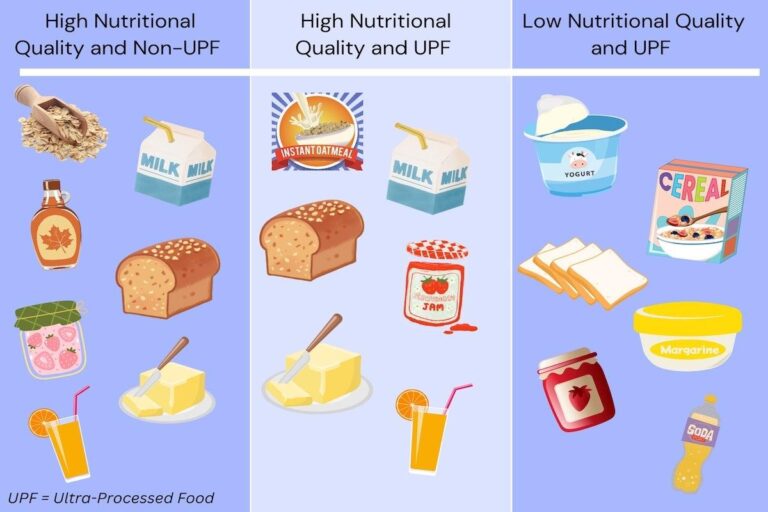Hey there! If you’ve ever grabbed a speedy snack or convenience meal from the store, you’ve probably dived into the world of processed foods. They’re everywhere—easy, tasty, and tempting. But have you ever wondered what those neatly packaged goodies are really doing to your nutrition and overall health? In this article, we’ll break down the impact of processed foods, debunk some common myths, and share simple tips to help you make smarter choices without giving up on flavor or convenience. Ready to get the scoop on what’s behind those shiny wrappers? Let’s dig in!
Table of Contents
- understanding the Ingredients Hiding in Processed Foods
- The Impact on Your Body and Long-Term Health
- Tips for Making Smarter Choices at the Grocery Store
- Easy Swaps to Boost Nutrition Without Sacrificing Flavor
- In Summary
Understanding the Ingredients Hiding in Processed Foods
When you open a bag of chips or grab a ready-made meal, chances are you’re consuming more than just the basic ingredients listed on the packaging. Processed foods often contain a cocktail of additives that serve various purposes—from extending shelf life to enhancing flavor and texture.Among these hidden components, you’ll commonly find preservatives like sodium benzoate and nitrates, which prevent spoilage but can disrupt your gut health over time. Then there are artificial sweeteners and colorings, designed to make the product more appealing but sometimes linked to adverse reactions or cravings that sabotage your nutrition goals.
Besides the additives, the base ingredients themselves are often highly refined and stripped of their natural nutrients. For example:
- Refined sugars increase calorie content without offering vitamins or minerals, contributing to energy crashes and inflammation.
- Hydrogenated oils introduce unhealthy trans fats that can elevate cholesterol and increase heart disease risk.
- Excess sodium used for flavor enhancement can lead to high blood pressure and water retention.
Being aware of these hidden elements empowers you to make informed food choices and helps you steer towards options that nourish your body rather of weighing it down.
The Impact on Your Body and Long-Term Health
Consuming processed foods regularly can lead to sustained imbalances in your body’s natural functions. These foods are often high in added sugars, unhealthy fats, and sodium, which contribute to increased inflammation and oxidative stress. Over time, this strain can challenge your immune system, disrupt hormone balance, and even impair cognitive performance. What’s more, the low fiber content in most processed products slows down digestion and negatively affects gut health, leading to discomfort and nutrient absorption issues.
The long-term consequences extend beyond immediate discomfort. Habitual intake of processed foods is strongly linked to an increased risk of chronic conditions such as:
- Obesity and metabolic syndrome
- Heart disease and hypertension
- Type 2 diabetes
- Certain types of cancer
By choosing whole, minimally processed foods instead, you can support sustainable energy levels, maintain a healthy weight, and protect your body’s vital systems. Your future self will thank you for feeding your body with real, nutrient-dense foods that promote longevity and resilience.
Tips for Making Smarter Choices at the Grocery Store
when navigating the aisles,focus on ingredients rather than flashy packaging. Opt for products with short, recognizable ingredient lists to avoid hidden additives and unnecessary sugars. Fresh or frozen fruits and vegetables, whole grains, and lean proteins should fill your cart as they’re less likely to be heavily processed. Don’t hesitate to compare labels — sometimes the same type of food varies widely in quality and nutritional value across brands.
Keep a handy list of pantry staples that balance convenience with nutrition. Items like canned beans (look for low sodium), plain yogurt, and nuts are rich in nutrients and require minimal prep. Additionally, try to shop the perimeter of the store where most whole foods live, rather than the middle aisles stocked with ultra-processed snacks and ready meals. Making small swaps regularly can dramatically improve your overall diet without feeling overwhelming.
- Choose whole foods over processed snacks.
- Read nutrition labels carefully—watch out for added sugars and artificial additives.
- Buy seasonal produce to enjoy fresher, more affordable options.
- Limit ready-to-eat meals; instead, prepare simple dishes from scratch.
Easy Swaps to Boost Nutrition without Sacrificing Flavor
Swapping processed ingredients for fresh, wholesome alternatives doesn’t mean you have to compromise on flavor. For instance, replacing white rice with quinoa or cauliflower rice instantly adds fiber and protein to your meals while keeping your favourite stir-fries vibrant and satisfying. Similarly, ditching sugary soda for sparkling water infused with fresh lemon or cucumber slices refreshes your palate without the sugar crash.Even small changes, like using Greek yogurt instead of sour cream, can offer a creamy texture with a nutritional boost, enhancing your dishes effortlessly.
When it comes to snacks, opting for homemade trail mix with nuts and dried fruit rather of pre-packaged chips keeps your cravings in check and fills you up with essential nutrients. Baking your own granola bars or swapping candy bars for dark chocolate squares are indulgent yet smarter choices. Embrace whole-grain breads or wraps in place of their highly processed cousins to enjoy added vitamins and longer-lasting energy. With just a few thoughtful substitutions,you can transform everyday meals into nourishing experiences bursting with taste.
In Summary
And there you have it—a closer look at how processed foods can sneak into our diets and impact our nutrition and overall health. While convenience is a huge plus, it’s important to stay mindful of what’s inside those packaged goodies. Remember, small changes like swapping out highly processed snacks for whole, fresh options can make a big difference over time. Your body will thank you! So next time you’re shopping or grabbing a quick bite, take a moment to think about feeding your health, not just your hunger. Here’s to making choices that help us feel our best every day!

